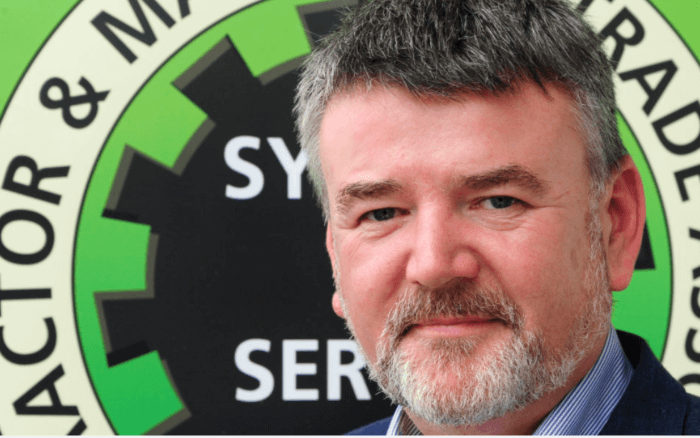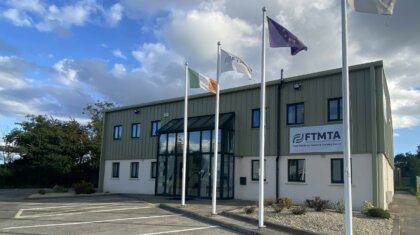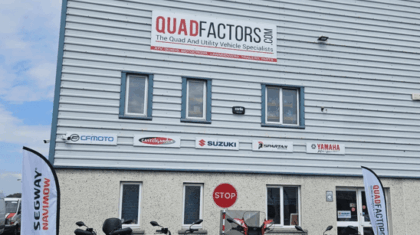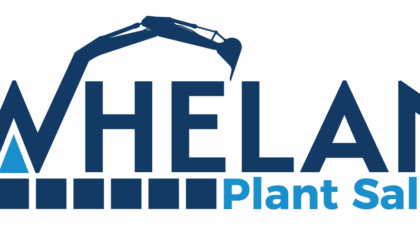As the trade body for the farm machinery business in Ireland, the Farm Tractor and Machinery Trade Association (FTMTA) is mainly known for two shows it holds every year on an alternate basis.
Unfortunately, with the restrictions in place due to Covid-19, the association has not been able to hold either the Punchestown show or the Grass and Muck event in north Tipperary.
It has also seen the departure of its long time executive director, Garry Ryan.
Plans for the 2022 Punchestown show are well advanced, although there is still an air of uncertainty over whether it will be possible to go ahead – as there is with everything these days.
New executive director at FTMTA
However, what is beyond doubt is that the organisation has found a new director who possesses the twin virtues of being well known in trade, and having a broad experience in Irish agriculture.
He also comes with a great deal of enthusiasm for the job.
Michael Farrelly stepped into the role in early August and has since been heavily involved in getting the FTMTA fully operational again, a job that has entailed a good many meetings and leg work.

Michael is already known in the trade as the past sales manager for the John Deere dealer, Meath Farm Machinery.
His experience with a distributor for a major manufacturer, which is leading the charge for digitalisation, has impressed upon him the speed by which the sector is changing.
His other roles prior to his spell with Meath Farm Machinery were primarily concerned with finance and farm advisory services.
Finance and consultancy
Much of his earlier career was spent with the family consultancy company, helping farmers through the labyrinth of paperwork involved with the construction of the motorways.
He then went on to work in the finance sector, in both the commercial and then the private banking side.
This was rudely interrupted by the financial crash, prompting a move back to his own farm where he still finishes dairy bred calves for beef.
Importance to the local economy
In an interview with Agriland, Farrelly said that taking up the reins of sales manager in a farm machinery company opened his eyes to just how important a role the trade plays in the local community.
“We had 40 people working at Meath Farm Machinery, and I would watch as delivery drivers, technicians and salesmen would go about their daily business, each contributing to the local economy.
“It was then I realised just how important the farm machinery trade, and businesses like us, were. We are the backbone of local communities,” he added.
Neither is it just local economies that are dependent upon the machinery trade.
A quick multiplication of the number of tractors sold by their average cost, doubled by the sale of other machinery, and then added to the value of exports by indigenous manufacturers, very quickly sees the best part of a billion euro being reached.

This value is not always recognised by the government Farrelly feels. He certainly sees highlighting just how big a part the sale and servicing of farm machinery plays in the economy, as an essential role of the association.
Big data versus small farms
Michael Farrelly appears a genuine advocate for the retention and development of local business.
As welcome as this is, it might be considered to clash with the vision of the future that entails greater automation and remote farm management through databases and algorithms, resulting in much fewer people required to farm the land.
While he does believe that this will come to many parts of the world, he does not see it happening in Ireland where farms are smaller and presently less suitable for the deployment of robotics and intensive scrutiny of fields and soil.
This does not preclude the use of many of the electronics seen in today’s tractors, only the implementation of systems that are far more suited to large scale farms in areas with a sparse population.
Recruitment woes
Despite this desire to see local dealerships thrive and support the community in doing so, there remains the awkward fact that many firms claim to have difficulty in attracting and retaining staff, especially technicians.
He considers it a quite legitimate task for the FTMTA to address this problem, yet he still feels that it is up to each company to make the effort in creating the conditions to which the right talent might be attracted.

One action he would urge upon companies is the establishment and highlighting of a defined career path in the industry.
Young entrants would also benefit from experiencing all aspects of the trade rather than be shoehorned into just the one role straight from school or college.
Another concern among dealers is the the unrealistic expectations of some farmers in aftersales support.
The trade appreciates that farmers are under tremendous pressure at times, but that should not be automatically transferred to dealers and their staff.
“You will not get the local car dealership to fix your car last thing on a Friday night, and tractor service technicians have a family life too, so why should they be considered somehow different?”
Overall role of the FTMTA
As time goes by the issues which constitute the worries of the trade will gradually shift. Yet there are two basic functions of the association that are likely to remain constant.
These are the showcasing of the industry to a wider world, and to act as an interface between it, and the government.

This latter is a two-way trade as much of the government legislation and its effect will need passing on to those companies without the resources to follow it closely themselves.
Elseways, there needs to be a flow of information to the government to help prevent further impetuous measures such as the inclusion of sprayers in the Targeted Agricultural Modernisation Scheme (TAMS), which immediately devalued the stock of used sprayers residing in dealers’ yards.
A third role is the collection and dissemination of market intelligence. We are all familiar with the news of new tractor registrations, but Michael Farrelly would like to see that expanded to other machines and the total value.




